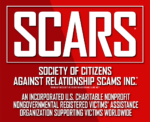SCARS™ Scam News: 9 Charged In Romance Scams And Mystery Shopper Scams In Chicago
9 Defendants Charged In Chicago In International Investigation Targeting “Romance Scams” And “Mystery Shopper” Schemes
CHICAGO — Seven Chicago-area residents are among nine individuals arrested in the United States and Nigeria as part of an international investigation into online “romance scams” and “mystery shopper” schemes.
During the Chicago-based investigation, dubbed “Operation Gold Phish,” law enforcement identified a variety of cyber-enabled fraud schemes allegedly carried out by conspirators in the U.S. and Nigeria. One of the alleged schemes involved “romance scams,” in which a conspirator builds trust with a victim through a purported online romance before convincing the victim to send money to a predetermined recipient. The conspirators initially contacted victims online via applications and websites, including Match.com, Facebook, and Instagram, the complaint states. Another alleged cyber-enabled fraud involved a “mystery shopper” scheme, in which conspirators fraudulently offered victims opportunities to work as a mystery shopper and receive commissions for evaluating retailers. The victim received a check through the U.S. mail with instructions to deposit it in a personal bank account, withdraw the money in cash, and wire it to a third party. The check turned out to be fake, and the victims were defrauded of the wired money, the charges allege.
A criminal complaint filed Dec. 4, 2018, in U.S. District Court in Chicago charged nine defendants with conspiracy to commit wire fraud. Arrests were recently carried out in Illinois, Texas, and Nigeria and all of the defendants are now in law enforcement custody. The Nigerian Economic and Financial Crimes Commission is conducting a related investigation of other individuals in Nigeria.
The U.S. charges were announced by John R. Lausch, Jr., United States Attorney for the Northern District of Illinois; Jeffrey S. Sallet, Special Agent-in-Charge of the Chicago office of the Federal Bureau of Investigation; and Craig Goldberg, Inspector-in-Charge of the U.S. Postal Inspection Service in Chicago. Valuable assistance was provided by the Nigerian Economic and Financial Crimes Commission. Assistant U.S. Attorneys Peter S. Salib and Charles W. Mulaney represent the government.
Arrested on the U.S. charges in Illinois were:
- DANIEL SAMUEL ETA, also known as “Captain” and “Etaoko,” 35, of Skokie;
- BABATUNDE LADEHINDE LABIYI, also known as “Junior,” 20, of Chicago;
- BARNABAS OGHENERUKEVWE EDJIEH, 29, of Chicago;
- SULTAN OMOGBADEBO ANIFOWOSHE, also known as “Ayinde,” 26, of Chicago;
- BABATUNDE IBRAHEEM AKARIGIDI, also known as “AK,” 39, of Chicago;
- MIRACLE AYOKUNLE OKUNOLA, 21, of Chicago; and
- OLUROTIMI AKITUNDE IDOWU, also known as “Idol,” 55, of Chicago.
Arrested in Texas was:
- ADEWALE ANTHONY ADEWUMI, 27, of Richardson, Texas.
Arrested in Nigeria was:
- OLANIYI ADELEYE OGUNGBAIYE, also known as “DonChiChi,” 26, of Lagos, Nigeria.
In addition to the romance and mystery shopper schemes, the complaint accuses the conspirators of engaging in various other cyber-enabled scams, including investment and employment frauds. The conspirators also defrauded victims by targeting corporate email accounts, the complaint states. In the email scam, known as a business email compromise, the conspirators fraudulently obtained usernames and passwords or sent “spoofing” email messages that claimed to be from a company employee, instructing the victim to change the wire instructions for bank payments. Per the instructions given in the fraudulent emails, the victims unknowingly wired funds to bank accounts controlled by the conspirators that had been opened in fictitious names utilizing fake passports, the complaint states.
The charge in the complaint carries a maximum sentence of 20 years in prison. If convicted, the Court must impose reasonable sentences under federal sentencing statutes and the advisory U.S. Sentencing Guidelines.
The public is reminded that charges contain only accusations and are not evidence of guilt. The defendants are presumed innocent and entitled to a fair trial at which the government has the burden of proving guilt beyond a reasonable doubt.
We Congratulate The U.S. FBI and the Nigerian EFCC On A Well Coordinated Investigation And Series Of Arrests.
We Hope That This Progress Will Continue!

SCARS™ Team
A SCARS Division
Miami Florida U.S.A.
END
– – –
Tell us about your experiences with Romance Scammers in our Scams Discussion Forum on Facebook »
– – –
FAQ: How Do You Properly Report Scammers?
It is essential that law enforcement knows about scams & scammers, even though there is nothing (in most cases) that they can do.
Always report scams involving money lost or where you received money to:
- Local Police – ask them to take an “informational” police report – say you need it for your insurance
- Your National Police or FBI (www.IC3.gov)
- The SCARS|CDN™ Cybercriminal Data Network – Worldwide Reporting Network HERE or on www.Anyscam.com
This helps your government understand the problem, and allows law enforcement to add scammers on watch lists worldwide.
– – –
Visit our NEW Main SCARS Facebook page for much more information about scams and online crime: www.facebook.com/SCARS.News.And.Information
To learn more about SCARS visit www.AgainstScams.org
Please be sure to report all scammers HERE or on www.Anyscam.com
All original content is Copyright © 1991 – 2018 SCARS All Rights Reserved Worldwide & Webwide – RSN/Romance Scams Now & SCARS/Society of Citizens Against Relationship Scams are all trademarks of Society of Citizens Against Relationship Scams Incorporated (formerly the Society of Citizens Against Romance Scams)
Legal Notices:
All original content is Copyright © 1991 – 2018 SCARS All Rights Reserved Worldwide & Webwide. Third-party copyrights acknowledge.
SCARS, RSN, Romance Scams Now, SCARS|GLOBAL, SCARS, Society of Citizens Against Relationship Scams, Society of Citizens Against Romance Scams, SCARS|ANYSCAM, Project Anyscam, Anyscam, SCARS|GOFCH, GOFCH, SCARS|CHINA, SCARS|CDN, SCARS Cybercriminal Data Network, Cobalt Alert, Scam Victims Support Group, are all trademarks of Society of Citizens Against Relationship Scams Incorporated.
Contact the law firm for the Society of Citizens Against Relationship Scams Incorporated by email at legal@AgainstScams.org





Leave A Comment